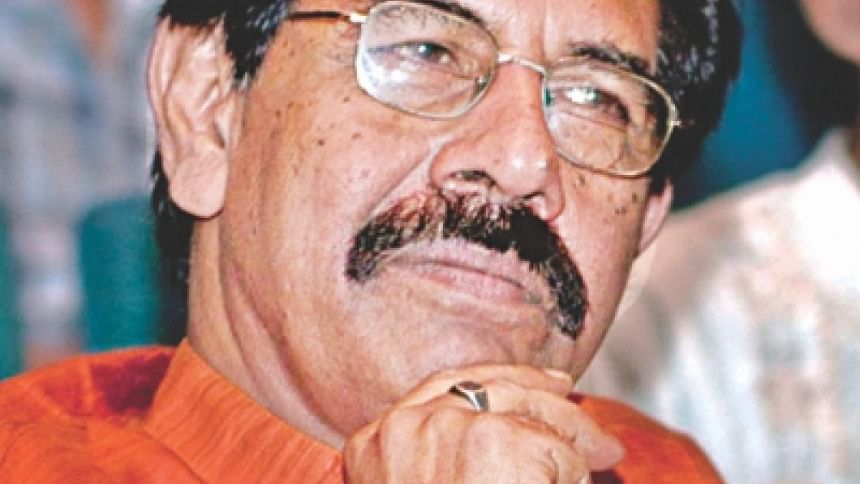The Art of Words

The romantic lyricist Mohammad Rafiquzzaman turns 75. Music organisation Nibedan felicitated the lyricist with a special programme conferring a citation on him, discussion and an offering of his compositions.
Back in 1965 it was undoubtedly a turning point for the budding lyricist Rafiquzzaman, hardly in his early 20's at that time. “Recognition of such magnitude for the song 'Mugdho amar ei chokh jokhon', among music connoisseurs was a catalyst to draw me closer to the world of lyrics and it soon became an inseparable part of me,” says a soft-spoken Rafiquzzaman.
Among his over 1,000 songs that have created ripples are “Amar Mon Pakhita Jaye Re Urey”, “Amake Ekti Doyel Bolechhey” by Runa Laila; “Paharer Kanna Dekhe” by Subir Nandi and countless hits by Sabina Yasmin such as “Jodi Moroner Porey Keo Proshno Korey”, “Tumi Eshechho Bohudin Por”; “Shobai Boley Joto Shorbonasher Muul” by Nargis Perveen; “Amar Baul Moner Ektara Ta”, a duet by Rafiqul Alam and Shammi Akhter and more ---it would not be an overstatement to say that Rafiquzzaman is the most accomplished among the contemporary lyricists.
A student of literature, Rafiquzzaman was irresistibly drawn to music. Like most amateur writers, Rafiquzzaman penned his first lyric, a parody, for a college function in 1961. He was then studying at his hometown in Jessore. Soon he joined Bangladesh Betar and set sail on his journey to the world of timeless songs.
A nostalgic Rafiquzzaman recalls the golden days of music. “The talented Abu Zafar was my contemporary. My elder brother Dr. Mohammad Muniruzzaman; Professor Abu Hena Mustafa Kamal; Abul Hayat Mohammad Kamal and Fazle Khuda were acclaimed lyricists when I started,” he continues.
Eminent composers Abdul Ahad, Satya Shaha, Dhir Ali, Khondokar Nurul Alam, Azad Rahman and others created timeless gems that remain unmatched.
“Film songs are situational,” adds the lyricist. “It is a combined effort of lyricists, music composers, artistes, musicians and the recordists. We would spend hours together with the music composers and the artistes would attend regular rehearsals before a song was created,” he added.
“Many of my popular songs such as 'Dukhkho Amar Bashor Raat-er Palonko', by Sabina Yasmin; 'Bondhu Hotey Cheye Tomar Shotru Boley Gonno Holaam' by Subir Nandi, 'Eto Shukh Shoibo Kemoney' by Nilufar Yasmin were included as playbacks,” he went on saying.
Rafiquzzaman was awarded the BACHSAS and National Awards for lyrics for “Tumi Emoni Jaal Petechho Shongshar-e” (Shubhoda) by Subir Nandi; “Jonom Jonom Dhore Prem Piyashi” by Sabina Yasmin (Debdas); and “Phuler Bashor Bhanglo Jokhon” by Probal Chowdhury (Chandranath).
Apart from scriptwriting for movies and directing quite a few films, Rafiquzzaman has penned a book on the technique of lyric writing, titled “Adhunik Bangla Gaan Rochonar Kolakoushal”.
Rafiquzzaman is not totally disheartened about contemporary writers. “We have distanced ourselves from them, and so have they. This has inevitably created a vacuum in the field. If only we nurture the latent talents, we would be able to create a new generation of song writers,” he said.
“In our country the lyricists become a forgotten chapter when a song becomes a classic,” notes Rafiquzzaman.
“I prefer the word “Geeti-kobi” to “Geetikar”, which is musical on its own,” he adds with a smile.
“Once we appreciate the meaning of the word “geeti-kobi”, and get the right inspiration, lyricists will once again be proud to have their name associated with at least one timeless piece of work in their lifetime, rather than a thousand one-day hits,” he concludes.

 For all latest news, follow The Daily Star's Google News channel.
For all latest news, follow The Daily Star's Google News channel. 



Comments